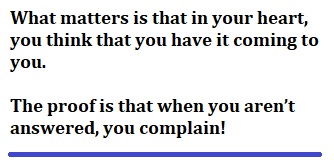
Hearing Moshiach’s Footsteps
We all know people who complain, "I prayed and wasn't answered, I said thank you and wasn't answered." Rabbi Arush explains why they weren't answered yet...

We all know the type of people who say “please” with their mouths, but they really mean “give it to me.” They learned in preschool that “please” is the magic word to get everything they want, but they still haven’t learned what the word “please” really means.
In my last article Know Your Place, I discussed the common issue of people feeling that “I deserve everything,” versus the humility of Moshe Rabbeinu.
Don’t think that Moshe didn’t know how many merits he had. He knew full well how much he had accomplished. But he truly lived this deep point: “Everything that I have, really belongs to Hashem. I didn’t accomplish this on my own. Hashem doesn’t need me because He has plenty of messengers. If He chose me to be His messenger, then I owe Him endless gratitude and thank you’s…”
Moshe understood that he really didn’t deserve anything, because everything that he accomplished was a gift from Hashem. Since he knew that he couldn’t do anything without Hashem, then does he deserve credit for what he does?! Just the opposite: In every merit Hashem gives me, I owe Hashem more gratitude!
Moshe Rabbeinu thus exemplified humility. The more merits and mitzvot Hashem gave him, the more he felt that he owed Hashem, and the humbler he became. Therefore, he always requested only a free gift, without ever thinking that he had merit.
Recognize that requesting a “free gift” is not a play on words, a secret password, or magic. A free gift is a true and deep feeling that Hashem does not owe me anything. Not only does Hashem not owe me anything, but who am I at all that Hashem should answer me? It’s the humility to recognize that I am only a creation. No one owed me anything to create me, and no one owes me anything to continue living on even the most basic level. Nevertheless, I believe that Hashem is merciful and kind, and gives free gifts even to those who are not at all worthy. Hashem desires that we should pray to Him and request what we want both physically and spiritually. Therefore, I am praying, and requesting a completely free gift.
Any other outlook whereby a person thinks that Hashem owes him something, is a total lie. We find lots of people like this in our generation; people who are bitter and complaining that they prayed, traveled to the graves of the righteous, said thank you every day, and did special things that are supposed to “work” to get what they want (segulot), and weren’t answered. These complaints stem from the lack of this understanding.
Understand that such prayers aren’t prayer; they are a claim on Hashem. He thinks that he worked for Hashem and now he is bitter that he didn’t get paid back with what he wanted. Basically, such prayers are really saying, “Give me what I deserve!” Therefore, these prayers are not answered. In fact, they only make the situation worse and bring more suffering upon a person G-d forbid, since complaining against Hashem is a serious sin.
It also doesn’t matter what words you say with your lips – whether they are words of prayer, Tehillim, or even saying “thank you.” What matters is that in your heart, you think that you have it coming to you. The proof is that when you aren’t answered, you complain! This proves that your thanking was only lip service, and you weren’t really asking for a free gift.
 This is why the Code of Jewish Law states that a person is forbidden to think to himself, “it’s appropriate that Hashem should fulfill my request because I really focused on my prayers.” The Gemara calls such prayer “prayer in depth” and says that it a great sin. How could praying with such great focus be a sin?! Rashi explains that the sin is the thoughts the person mulls in his heart afterwards that Hashem should reward him for concentrating on his prayers, by fulfilling his needs and granting his requests.
This is why the Code of Jewish Law states that a person is forbidden to think to himself, “it’s appropriate that Hashem should fulfill my request because I really focused on my prayers.” The Gemara calls such prayer “prayer in depth” and says that it a great sin. How could praying with such great focus be a sin?! Rashi explains that the sin is the thoughts the person mulls in his heart afterwards that Hashem should reward him for concentrating on his prayers, by fulfilling his needs and granting his requests.
If we want to do something good for ourselves, and for the whole world, we need to work hard at living this concept, for four reasons:
- This is the truth! No one wants to live a lie.
- This is the most basic level of derech eretz, living properly, in relation to the Creator of the World, who gives us so much good for free. No one wants to be an ingrate and not appreciate how much good Hashem is giving him.
- This is the only real way to pray, and therefore, the only real way to merit to the salvations you need.
- This is the only real way to bring the full Redemption. This is as Rebbe Nachman teaches in Sefer HaMiddot (The Aleph-Bet Book): “When you see humility increasing in the world, look out for the footsteps of Moshiach.”
Only in this way can we really thank Hashem. If when you begin to thank Hashem you feel that you owe Hashem a million thank you’s, so when you finish, you should feel that now you owe Hashem a billion thank you’s! After everything that Hashem has already given you, now in His mercy He has also given you the merit to say thank you?! Therefore, you only owe Hashem more and more!














Tell us what you think!
Thank you for your comment!
It will be published after approval by the Editor.